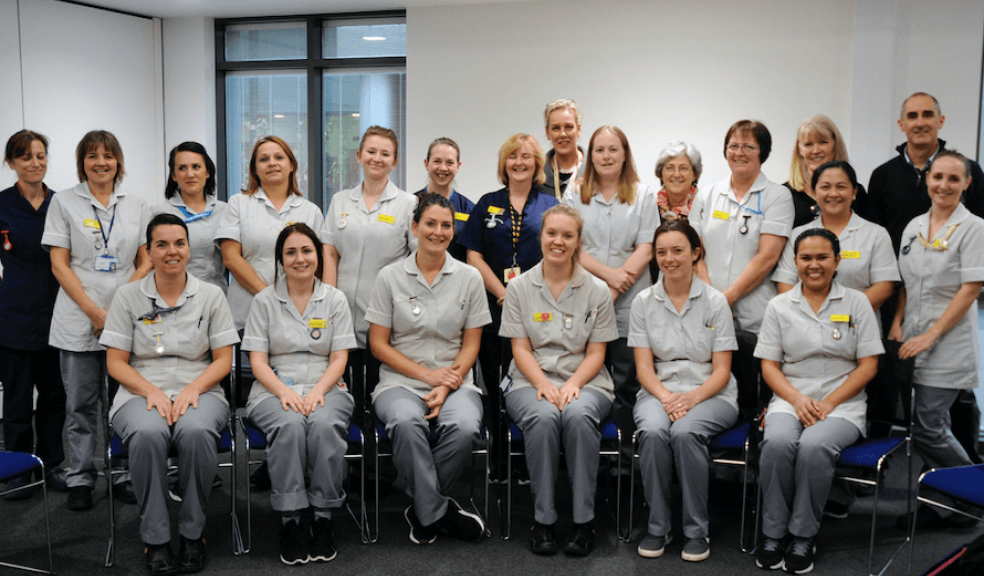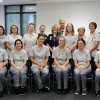
Devon's first wave of Nursing Associates set to finish training
A county-wide pilot designed to train a new generation of frontline nursing staff has proved to be a great success as its first wave of recruits near the end of their training.
Devon, which faces unique challenges attracting registered nurses due to its large rural area and shortage of supporting transport routes, is one of 11 first-wave ‘nursing associate’ pilot sites and the only Sustainability and Transformation Partnership (STP)-wide site selected and funded by Health Education England (HEE).
Nursing Associates will be part of the frontline clinical workforce and help to bridge the gap between health and care assistants and registered nurses. They offer a brand new and exciting entry-point into a fully registered nursing career for a range of people including existing health care assistants. Those who complete the two-year training can take a shortened nursing degree and go on to become registered nurses whilst some may prefer to continue in their Nursing Associate role, being ambassadors for future Nursing Associates.
Out of Devon’s original 69 Trainee Nursing Associates who began their training in early 2017, 63 remain with the programme and will be able to apply to join the Nursing and Midwifery Council (NMC) register in early 2019. Once on the register, these individuals can then be employed as qualified Nursing Associates, and people can have confidence they will have the right skills and knowledge to look after them.
Since January 2017 the trainees have completed placements in various health and social care providers across the county, among them acute and community hospitals, mental health trusts, private care homes, GP practices, Hospiscare and the South Western Ambulance Service.
The training is a combination of work-based competencies, hands-on experience and at least one intensive study day a week. At the end of the course, the trainees are awarded permanent Nursing Associate positions with their original employing organisations, including acute trusts across Devon and within the not-for-profit, independent health and social care provider, Livewell Southwest.
Once the pilot launched last year, the value of the trainees quickly became clear to many organisations taking part. The pilot has also helped to highlight areas for more development, such as ensuring trainees get protected learning time and providing them with extra guidance on medication where required.
George Coxon, Owner and Director of Pottles Court and Summercourt care homes in south Devon, said: “We’ve been extremely pleased to be part of this initiative. The mutual value of having the trainees with us has been an example of true integrated working between social care (care homes) and the NHS. The value of the trainees for our residents, families and staff has been immense and we are eager to be part of any future trainee intakes.”
A new wave of Devon trainees enrolled at Plymouth University in September and it’s now hoped the Nursing Associate role can be extended into more local health and social care organisations in Devon and further afield into Cornwall. At national level, the Nursing and Midwifery Council became the regulator in law for the Nursing Associate cohort in July 2018, and will open the Nursing Associate part of the NMC register in January 2019, cementing the profession in the health and social care workforce.
Em Wilkinson-Brice, Deputy Chief Executive/Chief Nurse at the Royal Devon and Exeter NHS Foundation Trust, the Devon pilot’s lead organisation, and Chair of the Devon STP Nursing Associate Programme Board, said: “The Nursing Associate role provides a dynamic new career pathway into nursing and it will help to strengthen and enrich the nursing skill base across Devon at a key time in the transformation of local health and social care services. In a short time they have made a really big difference to patients, their families and staff and I am looking forward to welcoming our first wave of qualified Nursing Associates following their expected formal registration next year.”
Dawn Slater, Director of Clinical Practice and Development at Livewell Southwest, said: “We see this programme as a great way for individuals to start an interesting and valued career, and in turn, the trainees have impressed mentors, colleagues and patients alike with their enthusiasm and commitment.”
Jane Viner, Chief Nurse at Torbay and South Devon NHS Foundation Trust, said: “The Nursing Associate role will be a critical part of the multi-disciplinary team that includes primary care, mental health, social care, voluntary and independent sector colleagues. The passion and commitment of the Nursing Associates has made this pilot a success and I look forward to welcoming future trainees.”
Darryn Allcorn, Chief Nurse at Northern Devon Healthcare NHS Trust (NDHT), said: “Our trainees are already being recognised for the skills and talent they bring to NDHT and the difference they are making to the lives of our patients and their loved ones. We’re delighted to have welcomed a second cohort of trainee Nursing Associates this year.”
Bev Allingham, Deputy Chief Nurse at University Hospitals Plymouth said: “We are delighted to have been part of this exciting and forward thinking development programme for Nursing Associates and it has been a very positive experience being part of a wider STP pilot. There has been shared learning and improvement across Devon with overwhelmingly positive feedback from Nursing Associates and our wider colleagues. We are already on cohort three and planning further cohorts as part of creating and growing a sustainable workforce. It’s wonderful to see the contribution nursing associates bring to our local health economy and directly to our patients.”
Professor Lisa Bayliss Pratt, Chief Nurse and Interim Regional Director for London HEE, said: “The high level of interest in delivering training for this important role means that we have been able to select even more sites to take forward the training. It further underlines the real appetite for helping to deliver this new role which we believe can provide a real benefit to the nursing and care workforce across a range of settings and play a key role in the delivery of patient care with safety at its heart.”




















